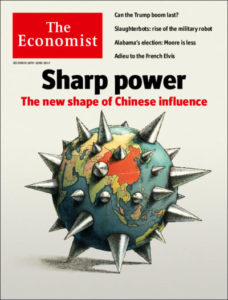 China’s ruling Communist Party launched a full-fledged campaign to “tell China’s story well,” spending billions of dollars on propaganda efforts.* Yet while an authoritarian state like China can control political discussion at home, it is more difficult to craft a message of benevolent paternalism abroad, note University College Dublin researchers Samuel Brazys and Alexander Dukalskis.
China’s ruling Communist Party launched a full-fledged campaign to “tell China’s story well,” spending billions of dollars on propaganda efforts.* Yet while an authoritarian state like China can control political discussion at home, it is more difficult to craft a message of benevolent paternalism abroad, note University College Dublin researchers Samuel Brazys and Alexander Dukalskis.
Confucius Institutes are arrangements on university campuses across the globe to host Chinese culture and language instructors – an effort ultimately supervised by the CCP’s Central Propaganda Department. While research suggests Confucius Institutes help facilitate an improved portrayal of China abroad, the gains may be overtaken by broader trends, they write for The Washington Post’s Monkey Cage blog:
 sharpIn fact, despite the opening of hundreds of Confucius Institutes from 2005 to 2017, the GDELT data indicates overall global media tone about China has become markedly more negative over that time, with particular downturns from 2012 to 2013 and from 2014 to 2015. CIs might be swimming against the tide.
sharpIn fact, despite the opening of hundreds of Confucius Institutes from 2005 to 2017, the GDELT data indicates overall global media tone about China has become markedly more negative over that time, with particular downturns from 2012 to 2013 and from 2014 to 2015. CIs might be swimming against the tide.
Indeed, high-profile scuffles in the South China Sea, accusations of debt-trap diplomacy along China’s Belt and Road countries, and China’s repression of ethnic minorities or Nobel Peace Prize winners (and even their families) may offset any modest gains from CIs and other public diplomacy initiatives.
* What the National Endowment for Democracy calls Beijing’s ‘sharp power’.







